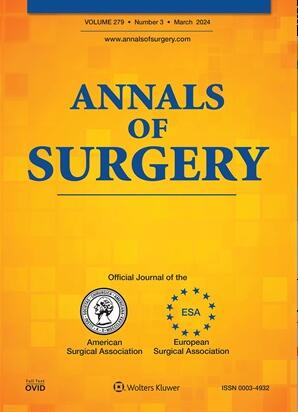Attitudes toward Sustainability among Surgeons at Ten Academic Hospitals in the United States: Are we Ready, Willing, and Incentivized to Change?
IF 7.5
1区 医学
Q1 SURGERY
引用次数: 0
Abstract
OBJECTIVE Given the outsized contribution of surgical care to the carbon footprint of the health sector, we aim to understand attitudes towards sustainability among academic surgeons in the United States (U.S.). SUMMARY BACKGROUND DATA The healthcare sector accounts for 8.5% of United States (U.S.) greenhouse gas emissions-of which one third come from surgical care. Though prior studies suggested that surgeons are aware of operating room waste and interested in improving sustainability, they were not nationally representative and did not ask about specific changes surgeons were willing to make or what incentives would promote such changes. In this study, we aim to ascertain a more granular understanding of surgeons' views on sustainability in a representative sample of U.S. academic surgeons. METHODS We surveyed surgeons at ten academic surgery programs representing all U.S. geographic regions. The survey contained questions on general attitudes towards sustainability, willingness to make sustainable changes, and the degree to which certain incentives would motivate change. Surgeons rated questions on Likert scales, and we calculated the proportion of respondents who indicated strongly positive responses. RESULTS Overall, 247 out of 523 surgeons (47%) responded to the survey. Similar majorities of respondents felt that the problem of operating room waste was critical (n=155, 63%) and were motivated to improve the sustainability of their practices (n=160, 65%). Five respondents (2%) felt their institution put effort into sustainability education. Most respondents (n=243, 98%) were willing to make at least one of the sustainable practice changes in our survey, with the greatest number willing to reduce items on their preference cards following periodic review (n=227, 92%). Respondents were more motivated by personal cash incentives than non-cash or departmental incentives. Using factor analysis, we derived five factors from survey responses: (1) general attitudes, (2) education, (3) willingness, (4) responsiveness to personal cash incentives, and (5) responsiveness to other incentives. CONCLUSIONS Surgeons understand that operating room waste is a problem and most say they are willing to make individual changes to improve operating room sustainability. However, a majority would be motivated to improve sustainability by personal cash incentives which are rarely implemented. Additional work will be needed to operationalize surgeons' positive views on sustainability into practice changes that meaningfully impact climate change.美国十所专科医院外科医生对可持续发展的态度:我们准备好了吗?我们愿意改变吗?
鉴于外科护理对卫生部门碳足迹的巨大贡献,我们旨在了解美国学术外科医生对可持续性的态度。摘要背景数据医疗保健行业占美国温室气体排放量的8.5%,其中三分之一来自外科护理。尽管先前的研究表明,外科医生意识到了手术室的浪费,并对提高可持续性感兴趣,但这些研究并不具有全国代表性,也没有询问外科医生愿意做出的具体改变,也没有询问促进这种改变的激励措施。在这项研究中,我们的目标是在美国学术外科医生的代表性样本中确定外科医生对可持续性的看法的更细致的理解。方法:我们调查了代表美国所有地理区域的10个学术外科项目的外科医生。调查的问题包括对可持续性的一般态度、进行可持续变革的意愿以及某些奖励措施将在多大程度上推动变革。外科医生用李克特量表对问题进行评分,我们计算出强烈肯定回答的受访者比例。结果523名外科医生中,有247名(47%)回应了调查。类似的大多数受访者认为手术室浪费的问题是至关重要的(n= 155,63%),并有动力提高他们的做法的可持续性(n= 160,65%)。五名受访者(2%)认为他们的机构在可持续发展教育方面付出了努力。在我们的调查中,大多数受访者(n=243, 98%)愿意做出至少一项可持续实践的改变,在定期审查后,最多的人愿意减少他们偏好卡上的项目(n=227, 92%)。受访者更倾向于个人现金奖励,而非非现金或部门奖励。利用因子分析,我们从调查反馈中得出五个因素:(1)一般态度,(2)教育程度,(3)意愿,(4)对个人现金激励的反应,(5)对其他激励的反应。结论外科医生明白手术室浪费是一个问题,大多数人表示他们愿意做出个人改变,以提高手术室的可持续性。但是,大多数人会受到很少执行的个人现金奖励的激励来改善可持续性。将外科医生对可持续性的积极看法转化为对气候变化有意义的实践变化,还需要做更多的工作。
本文章由计算机程序翻译,如有差异,请以英文原文为准。
求助全文
约1分钟内获得全文
求助全文
来源期刊

Annals of surgery
医学-外科
CiteScore
14.40
自引率
4.40%
发文量
687
审稿时长
4 months
期刊介绍:
The Annals of Surgery is a renowned surgery journal, recognized globally for its extensive scholarly references. It serves as a valuable resource for the international medical community by disseminating knowledge regarding important developments in surgical science and practice. Surgeons regularly turn to the Annals of Surgery to stay updated on innovative practices and techniques. The journal also offers special editorial features such as "Advances in Surgical Technique," offering timely coverage of ongoing clinical issues. Additionally, the journal publishes monthly review articles that address the latest concerns in surgical practice.
 求助内容:
求助内容: 应助结果提醒方式:
应助结果提醒方式:


